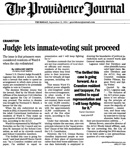Davidson v. City of Cranston documents

The District Court ruled the city's prison gerrymandering unconstitutional, reasoning that the city could not count incarcerated people in city council districts as if they were city residents while not treating them as constituents when it came time to represent them. But the First Circuit Court of Appeals reversed the decision, allowing the City to continue using the Census' unadjusted redistricting data despite the prison miscount.
Plaintiffs and Counsel
The plaintiffs were four Cranston voters who lived outside of Ward 6, and the ACLU of Rhode Island. The Prison Policy Initiative, ACLU Voting Rights Project, Dēmos, and Lynette Labinger of Roney & Labinger LLP were counsel to the plaintiffs.
Press releases, news coverage & editorials
- Statement in Response to Federal Appeals Court Decision In Cranston "Prison Gerrymandering" Case, September 21, 2016
- Prison Gerrymandering Is Unconstitutional, Federal Judge Rules by Cristian Farias, The Huffington Post May 24, 2016
- Cranston loses suit on prison gerrymandering by Karen Lee Ziner, The Providence Journal May 24, 2016
- Federal Court Rules that Prison-based Gerrymandering Violates the Constitution May 24, 2016
 Judge lets inmate-voting suit proceed, Providence Journal, September 11, 2014
Judge lets inmate-voting suit proceed, Providence Journal, September 11, 2014- Significant Victory in Fight to End "Prison Gerrymandering": Cranston, RI Lawsuit Will Move Forward, September 8, 2014
 Cranston, ACLU argue over counting inmates, by Katie Mulvaney, Providence Journal, April 24, 2014
Cranston, ACLU argue over counting inmates, by Katie Mulvaney, Providence Journal, April 24, 2014- ACLU sues Cranston over redistricting plan that counts ACI prisoners as residents of Ward 6 by Katie Mulvaney, Providence Journal, February 19, 2014
- Plan violates 'one person, one vote' principle of the U.S. Constitution, February 19, 2014
Legal documents and related materials
United States District Court for the District of Rhode Island
- Complaint, February 19, 2014
- Motion to Dismiss
- Cranston's Motion to Dismiss, March 13, 2014
- Plaintiffs' Opposition to Motion to Dismiss, March 31, 2014
- Defendant's Reply in Support of their Motion to Dismiss, April 7, 2014
- Judge's Memorandum and Decision, September 8, 2014
- Motion for Summary Judgment
- Cranston's Motion for Summary Judgment, July 9, 2015
- Plaintiffs' Opposition and Cross Motion for Summary Judgment, August 6, 2015
- Defendant's Reply in Support of their Motion for Summary Judgment, August 31, 2015
- Decision, May 24, 2016
Appeal: United States Court of Appeals for the First Circuit
- Briefs
- Plaintiff's Brief, July 26, 2016
- City's Reply Brief, August 2, 2016
- Briefs of Amici Curiae, September 2, 2016:
- Panel Decision, September 21, 2016
Events
- April 15-17, 2025:
Sarah Staudt, our Director of Policy and Advocacy, will be attending the MacArthur Safety and Justice Challenge Network Meeting from April 15-17 in Chicago. Drop her a line if you’d like to meet up!
Not near you?
Invite us to your city, college or organization.
 Judge lets inmate-voting suit proceed
Judge lets inmate-voting suit proceed Cranston, ACLU argue over counting inmates
Cranston, ACLU argue over counting inmates


